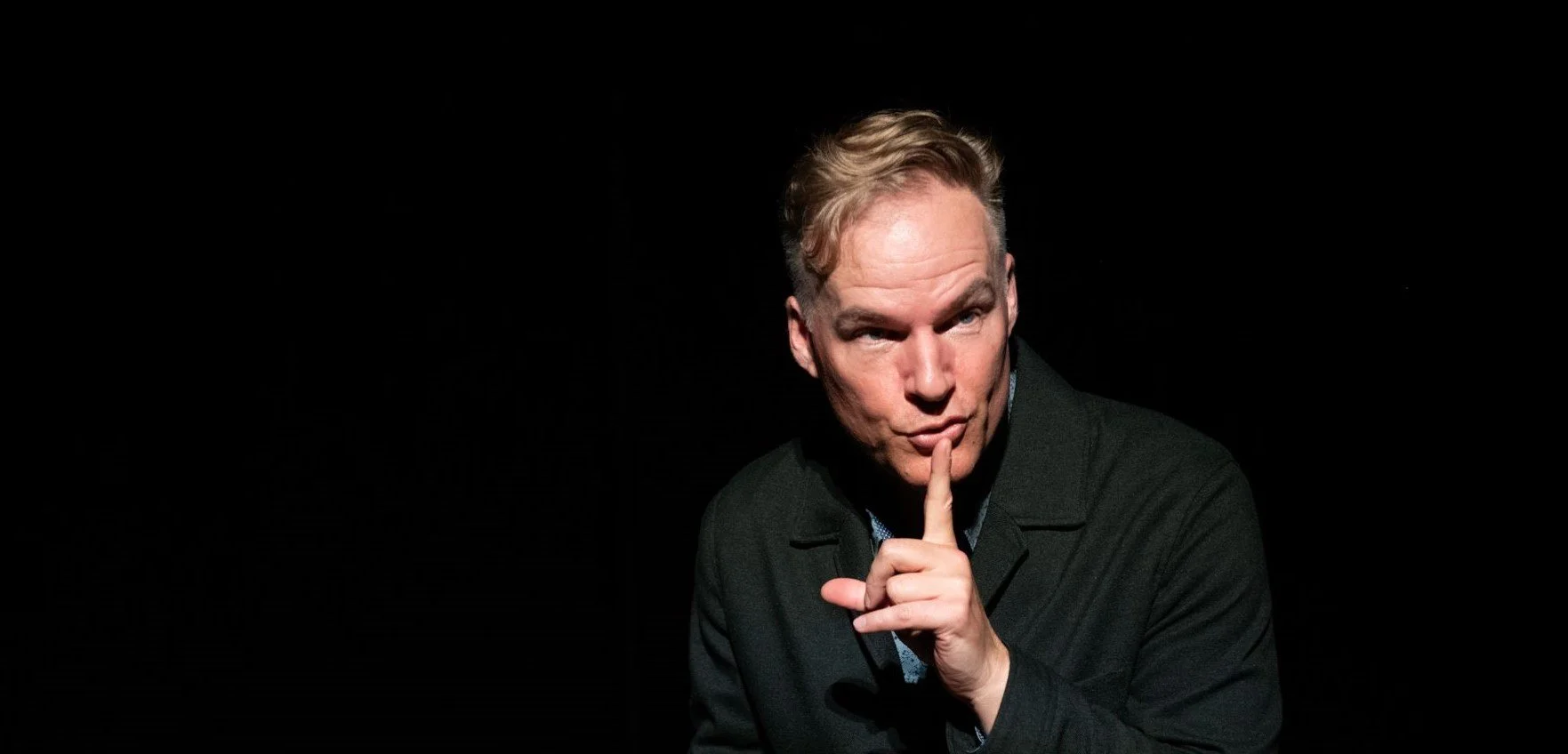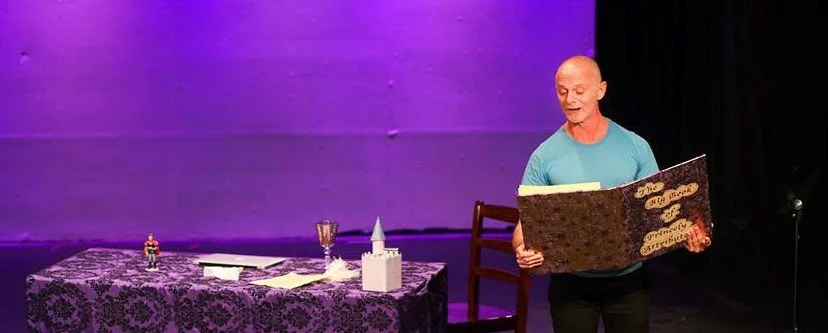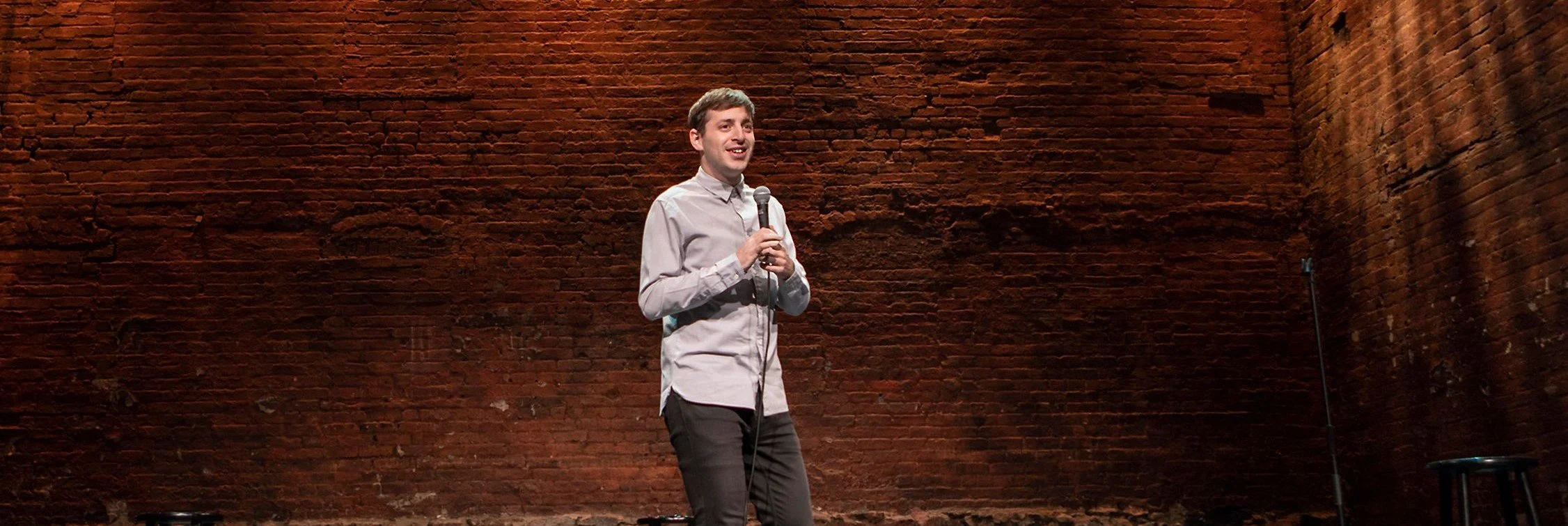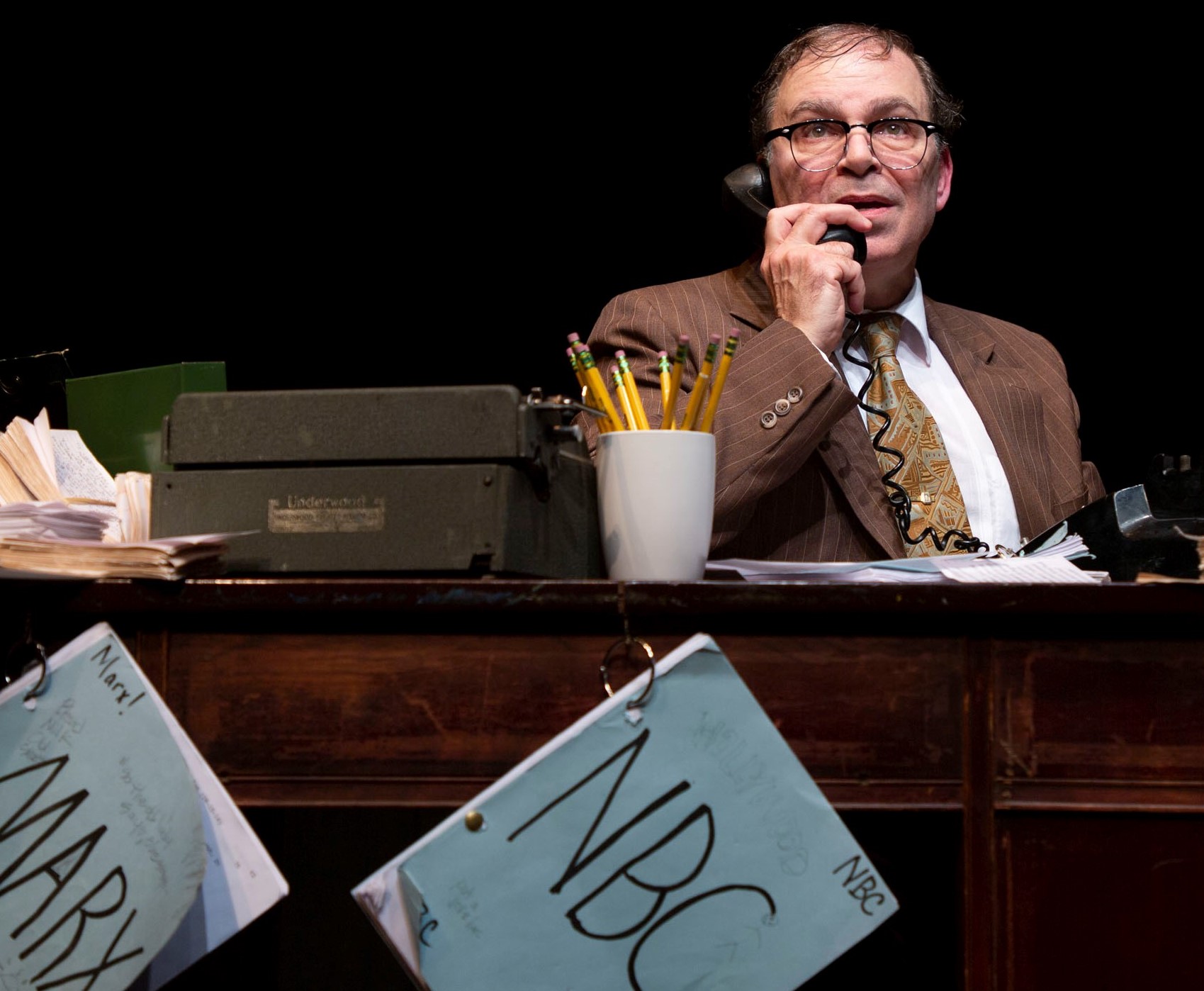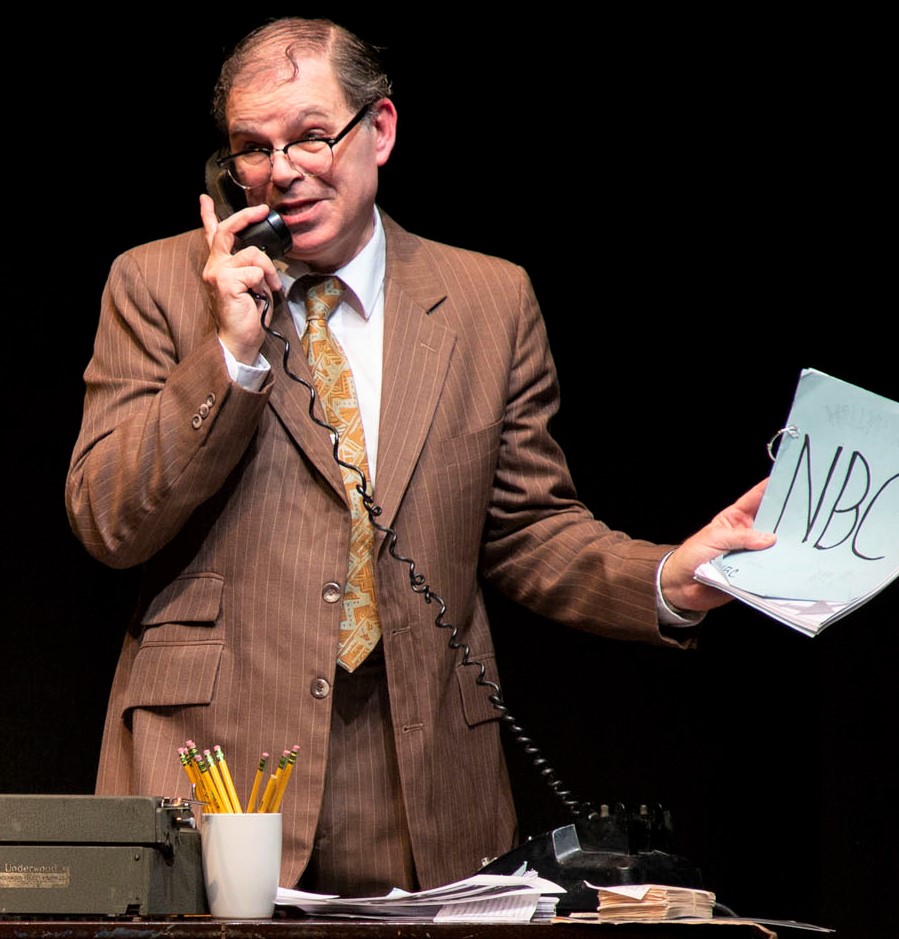Some people, as students or adults, hear the word “poetry” and run in the other direction. They’re that intimidated, bored, puzzled or whatever by it. Gordon Boudreau obviously understands this, as he has condensed the history of poetry to major highlights and demonstrates just how irreverent and free-spirited one can be with verse in his solo show The Wildly Inappropriate Poetry of Arthur Greenleaf Holmes.
Everything’s Fine
If big-city Easterners could imagine what life in Midland, Texas, is like, they might conjure up images of a remote, semirural, small city with mundane lifestyles, cowboy hats, and thick drawls. Well, most of the stereotypical descriptors don’t apply here. Other than for the Texas sand, wind, and heat that Douglas McGrath describes in his solo play Everything’s Fine, there is much in McGrath’s story about growing up there that is universal.
The Fall
Amsterdam’s red-light district, circa 1956. A man walks into a bar and chews on the question: What does it mean to fall from grace? And, as a man who is having a few drinks in a bar and talking to strangers, he will ask many more questions, sometimes personal and often philosophical. In The Fall, by Albert Camus, a French philosopher who won the Nobel Prize in Literature in 1957 and is considered the father of existentialism, the man in the bar is Jean-Baptiste Clamence, a former Parisian lawyer who has himself fallen from grace.
Remember This: The Lesson of Jan Karski
David Strathairn, whose stellar career as a character actor has spanned decades, gives a brilliant, riveting solo performance in Remember This: The Lesson of Jan Karski. Playing a Pole who experienced the Holocaust, he draws on historical evidence and the testimony that playwrights Clark Young and Derek Goldman employ in their portrait of a righteous and desperate man determined to prevent the annihilation of his country’s Jews. This is the real-life Karski, humble, modest, and painfully aware of what he could do, and more so of what he could not do, to save them.
The Near Disaster of Jasper & Casper
It can’t be easy to invent a brand-new fairy tale; even James Lapine and Stephen Sondheim had to rely on the old favorites. But here comes Jason Woods, not only cobbling together an entirely original fantasy with The Near Disaster of Jasper & Casper, but performing all the parts, with distinctive voices and personalities for all the characters. Woods may seize on some familiar plot points, and he’s not always tidy: “Jasper and Casper” don’t rhyme perfectly with “Disaster,” as he seems to have been aiming for. But he knocks himself out to engage the audience.
Katsura Sunshine’s Rakugo
Katsura Sunshine’s Rakugo is a fresh and funny solo show in which the director and star, Katsura Sunshine, spins yarns with entrancing charm in the ancient Japanese comic storytelling tradition known as rakugo. It is a pleasure to come across a piece that deals, wittily and delightfully, with a little-known dramatic art form.
Mister Miss America
Neil D’Astolfo’s Mister Miss America provides many pleasures beyond its nifty title, even though the material treads some pretty familiar ground. In the solo show, the beauty pageant obsessions of gay hero Derek Tyler Taylor (D’Astolfo) take center stage. DTT wants to share the story of his attempt to break the gender barrier at a beauty pageant in southwestern Virginia, where the contestants mostly hail from obscure burgs, such as Bristol, Galax, Martinsville and Radford, and the announcer uses descriptions like “She’s hotter than your pappy’s pistol!” as an introduction.
Prince Charming, You’re Late
The title of Billy Hipkins’s solo show promises lighthearted fun, and the actor often has a twinkle in his eye as he performs it. However, in spite of the elfin charm of Hipkins himself—a sixtysomething gay man who has worked in theater as a dresser and occasionally an actor—Prince Charming, You’re Late strikes many of the darker notes of a fairy tale by the Grimm brothers.
Yes! Reflections of Molly Bloom
James Joyce’s Ulysses is a brilliant but dense and sometimes inaccessible work. Aedin Moloney’s solo performance in Yes! Reflections of Molly Bloom is adapted from Molly's “Yes!” soliloquy at the end of Joyce’s novel. Co-created by Moloney and acclaimed Irish author Colum McCann, the show is a remarkably ambitious collaboration, a welcome contribution to understanding the complexities of Molly Bloom (wife of Ulysses’ protagonist Leopold “Poldy” Bloom), and a consummate one-woman show.
Jews, God, and History (Not Necessarily in That Order)
Can an atheist serve as a guide to the history, customs, and longevity of the Jewish religion and its adherents? Moreover, how can an atheist recognize that a man who has just died is with God? At first glance, this seems quite absurd. Yet neither for Michael Takiff nor for his audience does it appear to be a problem. Jews, God, and History (Not Necessarily in That Order), Takiff’s one-man show, is a roller-coaster ride through Jewish belief, identity, and practice.
How the Hell Did I Get Here?
For Downtown Abbey aficionados, it is an unlikely stretch to imagine Lesley Nicol as anyone other than the series’ jovial, wise cook, Mrs. Patmore. The leap of imagination that transforms Patmore into a painfully shy, insecure, aspiring and often overlooked actress is a dilemma with which the audience for How the Hell Did I Get Here? must grapple. Ironically, Mrs. Patmore and Ms. Nicol may share a Northern British accent, but that’s where any comparison ends. The former’s “extreme makeover” as fashionable Lesley Nicol is not a makeover at all, but an internal and external transformation from her early childhood. Isn’t that what good acting is all about?
Just for Us
Despite Alex Edelman’s opening caveat that “my comedy barely works if you’re not a Jew from the Upper East Side,” he is one of the rare, masterful stand-up comics who can “cast out” and then successfully “reel back in” a diverse audience. He can take his monologue way off-topic, on a tangent that itself could be a stand-alone show. Although the thrust of Just for Us is his attendance at a white-supremacist gathering, along the way he signs and mimics the distress of a gorilla at Robin Williams’s death (the gorilla really grieved), then quips that Brexit should be called “The Great British Break-Off,” and lovingly, yet mercilessly, spears his family, their Hebrew names, his brother’s Winter Olympics prowess as part of the Israeli skeleton team, and his Orthodox Jewish parents’ finessing of Christmas (including a decorated tree in the garage) to comfort a bereaved Christian friend.
Approval Junkie
Comedian Faith Salie’s new solo show Approval Junkie, based on her book of the same title, is funny, insightful and heartfelt. Salie is an Emmy Award–winning journalist best known for her roles on NPR's Wait Wait…Don’t Tell Me! and CBS Sunday Morning. In her one-woman show, Salie begins with the adolescent need to seek approval. Her play explores the concept of the human need to be accepted and even revered.
Charmed Life: From Soul Singing to Opera Star
Many an autobiographical solo show has been born from hardship— growing up closeted, say, or having an intolerable job, or living through a war. Lori Brown Mirabal’s jumping-off point is the complete opposite. It’s right there in her show’s title, Charmed Life: From Soul Singing to Opera Star.
Incantata
Incantata, by Pulitzer Prize–winning Irish poet Paul Muldoon, is an elegy crafted into a theatrical narrative that loosely weaves together erudite poetic imagery and concrete memories with literary and artistic references. The experience is a journey through bumpy waters, a sensory and linguistic adventure with Stanley Townsend, a tremendously talented and physical actor, at the helm of the solo show.
A Sign of the Times
The solo play A Sign of the Times stars Javier Muñoz as a former physics professor who now works as a traffic controller near a construction site. Sounds of vehicles zooming past, slowing down or screeching to a halt are heard frequently, and Muñoz occasionally speaks with their unseen drivers.
Miss America’s Ugly Daughter
The life of Bess Myerson, the only Jewish woman to have won the Miss America title, in 1945, was two sides of a coin: the face was that of a very beautiful, proud, and successful woman, but her private life involved difficult relationships, most notably with her daughter, Barbara (Barra) Grant. Their mother-daughter interaction, and Bess’s attempts to create her daughter in her own image, are the center of Grant’s solo play/memoir Miss America’s Ugly Daughter. The audience never sees the subject, but she is sometimes heard offstage, her voice (by Anna Holbrook) always booming and intruding in her child’s life.
Happy Birthday Doug
Drew Droege made a big splash with his 2017 hit Bright Colors and Bold Patterns, in which his main character, Gerry, attended a gay wedding whose intendeds had asked on their invitation that nobody wear bright colors or bold patterns. Droege’s solo performance as Gerry let one know the other characters through his reactions to them. Now he is back with another solo show keyed to an important event: Happy Birthday Doug. And once again, he is making mincemeat of stereotypes in the gay world.
A Jewish Joke
A Jewish Joke is a one-man show about partnerships, but that is just one of its several paradoxes. The play explores Jewish comedy, though from the serious viewpoint of its effect during the era of the Hollywood blacklist, when humor could either get a guy out of a jam, or reinforce anti-Semitic stereotypes. Many old jokes are told during the 90-minute production; however, they are delivered with such odd undertones that it is impossible to tell whether director David Ellenstein was hoping for legit laughter or uncomfortable sighs from the vintage zingers that are rife with sexism and prejudice. And Joke is a play about writing which, when it falters, does so because the script is, at times, contrived or repetitious. When it succeeds, it does so because Phil Johnson, of San Diego’s Roustabouts Theatre Company, so fully inhabits his role that his character’s stressed-out persona transcends the page.
Phil Johnson as Bernie Lutz in A Jewish Joke, written by Johnson and Marni Freedman.
Johnson portrays Bernie Lutz, a film writer for MGM Studios in its mid-20th-century heyday. Though successful at his craft, he looks the worse for wear. His sad brown suit is wrinkled, his tie atrocious, his eyeglasses cheap, and his limp comb-over barely covers his scalp. He would be considered Kafkaesque, except that on this particular morning he finds he has been transformed into, not a cockroach, but a commie. His name, along with that of his lifelong friend and writing partner, Morris Frumsky, have turned up in Red Channels, the right-wing publication that, in 1950, accused scores of entertainers and journalists of having ties to the Communist Party (Real-life names cited by Red Channels ran the artistic gamut from Orson Welles to Dorothy Parker to Leonard Bernstein.).
It seems Morris had recently taken Bernie to a soirée that was more than just the cocktail-weenie extravaganza Bernie thought it to be. The fact that Morris is nowhere to be found as the play begins, despite the fact that their latest flick, The Big Casbah, is set to premiere that very evening, telegraphs all we need to know about Bernie’s impending doom. But Johnson, who co-wrote the piece with Marni Freedman, walks us through Bernie’s very bad day nonetheless. First, it turns out that the government had sent him a warning letter regarding the “important work of investigators under Senator Joseph McCarthy,” but he conveniently had torn it into three pieces without bothering to read it, allowing him to now build tension by slowly finding each section amid the piles of crumpled papers strewn about his bungalow. Then his colleagues begin disassociating. Danny Kaye shows him the door. Louis B. Mayer has no time for him. And when Harpo Marx gives him the silent treatment, he reaches a crisis point: testify against Morris to clear his own name, or protect his pal and risk sacrificing his career.
Bernie treads the fine line between comedy and tragedy. Photographs by Clay Anderson.
Without other characters in the room to play against, Bernie frequently turns to the audience and tells one of the many off-color gags he has collected on index cards. Most are groaners and, whether meant to be awful or not, they do keep the audience from becoming too emotionally caught up in Bernie’s dilemma. It’s the old “alienation effect,” a technique pioneered by another member of the Hollywood blacklist, Bertolt Brecht.
Bernie also has framed pictures of his wife and his parents with which to interact. But mostly, he is on the phone. Indeed, the plot revelations are entirely dependent on the seemingly endless number of calls that Bernie makes and receives. The playwrights employ a couple of devices to minimize the drudgery. Rather than repeatedly having to dial the rotary phone, Bernie has an unseen secretary place his calls. Somehow, she is able to do so with lightning speed, adding a surreal aspect to the evening. And Bernie answers the phone each time with a different one-liner (“Bernie’s Yacht Club”). None are particularly funny, but it beats enduring a hellacious string of hellos.
Production supervisor/designer Aaron Rumley provides a desk for Bernie to work behind, and I will just assume that its drawers are full. Why else install hooks across the front of it and glaringly hang from them the scripts that Bernie risks forfeiting? Regardless, Johnson, who has been touring and perfecting this role since 2016, when the show won Best Drama at the United Solo Fest NYC, makes it work, taking his character’s motto to heart: “When there is no mensch, be the mensch.”
A Jewish Joke, by Marni Freedman and Phil Johnson, runs through March 31 at The Lion Theater (410 W. 42nd St.). Evening performances are at 8 p.m. Wednesdays through Saturdays; matinees are at 3 p.m. Sundays. For tickets, call Telecharge at (212) 239-6200 or visit ajewishjoke.com.
Bleach
Tyler Everett, the protagonist of Dan Ireland-Reeves’s compelling play Bleach, takes a utilitarian view of whoring. A recent recruit to the world’s oldest profession, Tyler (Eamon Yates) has figured out how, on any given night, to reap maximal rewards at the intersection of human sexuality’s demand and supply curves.











